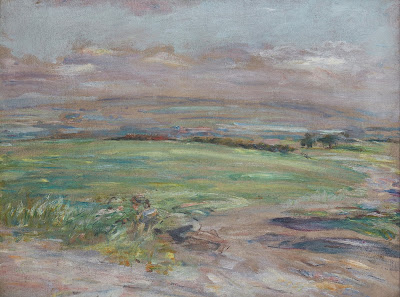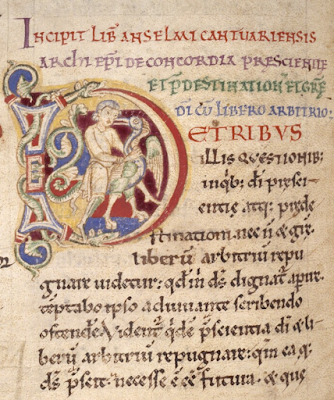Weekly update 10
 |
| Sir David Young Cameron, Cliffs and Crags of Ross |
I haven't read through it from start to finish, and I have a feeling it will need a good bit of revision. The organization is a bit weird: the thematic treatment gives way to a chronological treatment about halfway through. And I forget to mention Anselm's actual writings during a decade or two. But it's drafted, on time, and the hard part -- reminding myself of the historical tidbits and then figuring out how to craft them into something cohesive, with the right amount of detail -- is done.
I hope I've managed to convey something of Anselm's complex character, which is intriguing and has given rise to strikingly different readings in his recent(ish) biographers. I find myself increasingly drawn to Sally Vaughn's portrait of Anselm. Her Anselm is less baffled, less overwhelmed, a better tactician and administrator than Sir Richard Southern and Gillian Evans credit him with being. Yet she never represents Anselm as merely an ecclesiastical politician, however skillful: he is always a monk, always dedicated to order and obedience, and persuasive in large measure because of his magnificent gift for friendship. (Southern also notably emphasizes friendship in Anselm, though he worries too much about whether Anselm might have been a latent homosexual. Vaughn rightly describes this supposition as unlikely. It is also irrelevant, though in Southern's defense I will note that he was writing back when John Boswell's Christianity, Social Tolerance, and Homosexuality was a thing.) As Vaughn puts it, Anselm basically got people to do what he wanted to by loving them into submission. And the love was not a tactic: it was genuine. It was also widely reciprocated, even by some surprising characters. Only one person is reported to have hated Anselm in his adult life, and that was King William II -- called William Rufus (William the Red) after his red hair and hot temper.
But Rufus really, really hated him: "Yesterday I hated him with great hatred; today I hate him with even greater hatred; and he can be certain that tomorrow and thereafter I shall hate him continually with ever fiercer and more bitter hatred."
*****
There was no reasonably short, self-contained passage for this week's excerpt, so instead I will give you part of the chapter in the Life of Anselm in which Eadmer, Anselm's friend and biographer, recounts Anselm's death:
Palm Sunday dawned, and we were sitting by him as usual. And so one of us said to him, "My lord and father, we cannot help knowing that you are going to leave the world and be present at your Lord's Easter court." He replied, "If indeed that is his will, I shall obey his will gladly. But if instead he prefers that I remain among you long enough so that I can settle the question of the origin of the soul, which I am turning over in my mind, I would accept this gratefully, because I do not know whether anyone will be able to settle it after I am gone." . . .
Now when the community of the brethren were singing Lauds in the main church on Wednesday morning, one of us who were with him took a Gospel book and read to him the account of the Passion that was to be read at mass that day. And when he came to the words of the Lord, "You are those have have remained with me in my trials, and I appoint for you, as my Father appointed for me, a kingdom, that you may eat and drink at my table in my kingdom," he began to draw breath more slowly. So we recognized that he was now on the point of death, and he was lifted from his bed and placed on sackcloth and ashes. The whole congregation of his sons gathered around him, and, sending forth his final breath into the hands of the Creator, he fell asleep in peace. And so he departed as dawn was breaking on the Wednesday before the institution of the Lord's Supper, on 21 April in the year of Our Lord's Incarnation 1109, which was the sixteenth year of his pontificate and the seventy-sixth of his life.
*****
There is always another book to write, and always another feast to attend.



Comments
Post a Comment